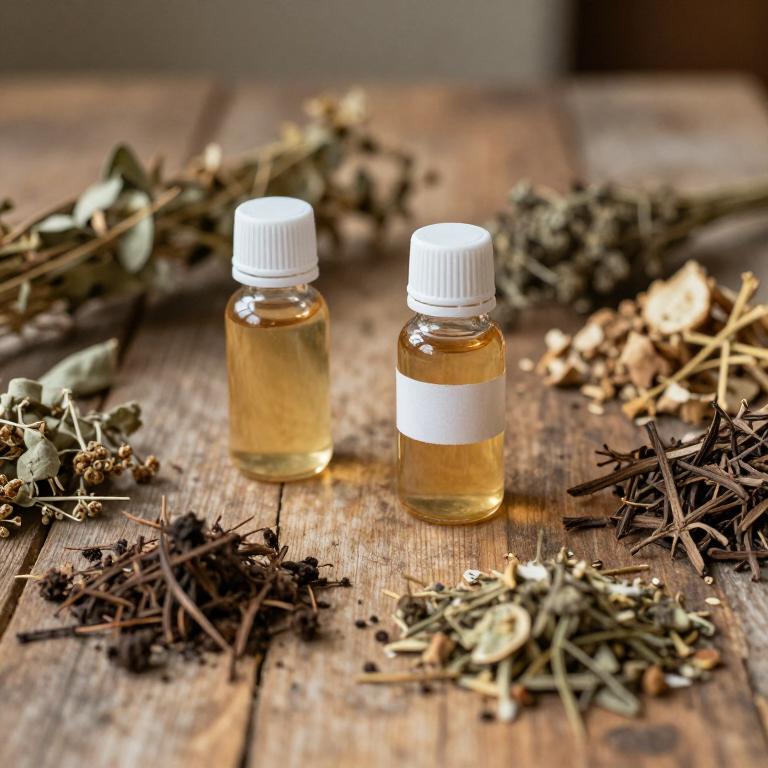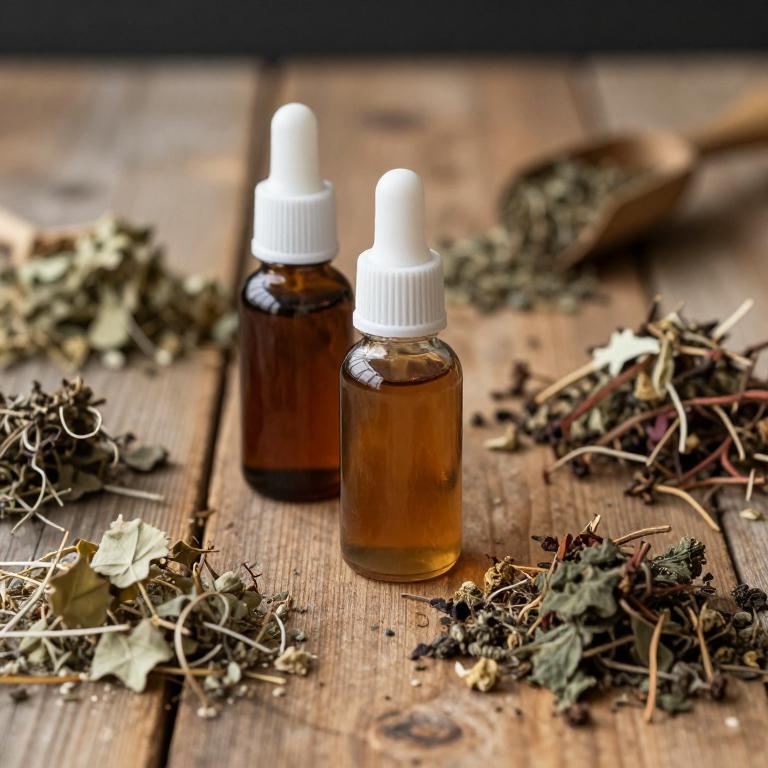10 Best Herbal Linctuses For Chest Congestion

Herbal linctuses are traditional remedies designed to alleviate chest congestion by soothing the throat and loosening mucus.
They often contain natural ingredients such as thyme, eucalyptus, and ivy, which have expectorant and anti-inflammatory properties. These linctuses are typically used for mild to moderate respiratory conditions like coughs and bronchitis. They are generally considered safe for most adults and children, though it's important to follow dosage guidelines.
Herbal linctuses can provide relief without the side effects associated with some over-the-counter medications.
Table of Contents
- 1. Eucalyptus (Eucalyptus globulus)
- 2. Thyme (Thymus vulgaris)
- 3. Fennel (Foeniculum vulgare)
- 4. Peppermint (Mentha piperita)
- 5. Ginger (Zingiber officinale)
- 6. Licorice (Glycyrrhiza glabra)
- 7. Scots pine (Pinus sylvestris)
- 8. Chamomile (Matricaria chamomilla)
- 9. Salvia (Salvia officinalis)
- 10. Anise (Pimpinella anisum)
1. Eucalyptus (Eucalyptus globulus)

Eucalyptus globulus, commonly known as eucalyptus or gum tree, is a widely used plant in herbal medicine, particularly for respiratory conditions.
Eucalyptus globulus herbal linctuses are formulated with extracts from the leaves of this plant, which contain active compounds like eucalyptol that help to soothe and relieve chest congestion. These linctuses work by acting as a decongestant, reducing mucus viscosity and promoting easier breathing. They are often recommended for individuals suffering from coughs, colds, or bronchitis, offering a natural and gentle alternative to conventional medications.
When used as directed, eucalyptus globulus linctuses can provide effective relief from chest congestion while minimizing the risk of side effects associated with synthetic drugs.
2. Thyme (Thymus vulgaris)

Thymus vulgaris, commonly known as thyme, is a popular herb used in the preparation of herbal linctuses for the relief of chest congestion.
These linctuses are formulated to soothe irritated airways and reduce mucus production, making them effective in alleviating symptoms of coughs and respiratory discomfort. The active compounds in thyme, such as thymol and carvacrol, possess antimicrobial and expectorant properties that help clear mucus from the lungs. Thymus vulgaris herbal linctuses are often recommended for their natural and gentle approach to respiratory care.
When used as directed, they can provide relief without the side effects commonly associated with over-the-counter pharmaceutical remedies.
3. Fennel (Foeniculum vulgare)

Foeniculum vulgare, commonly known as fennel, is often used in herbal linctuses to alleviate chest congestion due to its expectorant and antispasmodic properties.
These linctuses typically contain fennel seed or essential oil, which helps loosen mucus and ease coughing, making them beneficial for individuals with respiratory conditions such as bronchitis or the common cold. The aromatic compounds in fennel, like anethole, contribute to its soothing effect on the respiratory tract, reducing irritation and inflammation. When used as a natural remedy, fennel-based linctuses can provide relief without the side effects associated with some pharmaceutical treatments.
However, it is important to consult a healthcare professional before using these remedies, especially for children or those with existing medical conditions.
4. Peppermint (Mentha piperita)

Mentha piperita, commonly known as peppermint, is often used in herbal linctuses to help alleviate chest congestion due to its soothing and decongestant properties.
These linctuses typically contain a concentrated form of peppermint oil, which can help relax the bronchial muscles and ease breathing. The menthol in peppermint works by stimulating cold receptors in the airways, creating a cooling sensation that reduces the feeling of congestion. Peppermint linctuses are particularly beneficial for individuals suffering from dry coughs or chest tightness associated with colds or respiratory infections.
When used as directed, these herbal remedies can provide natural relief and support the body’s natural healing process.
5. Ginger (Zingiber officinale)

Zingiber officinale, commonly known as ginger, has been traditionally used in herbal linctuses to alleviate symptoms of chest congestion due to its anti-inflammatory and expectorant properties.
These linctuses typically contain powdered or extract forms of ginger, which help to loosen mucus and reduce irritation in the respiratory tract. The warming effect of ginger can also provide soothing relief to the throat and lungs, making it beneficial for individuals suffering from coughs and bronchial congestion. While generally safe for most adults, ginger linctuses may cause mild gastrointestinal discomfort in some individuals, and it is advisable to consult a healthcare professional before use, especially for children or those with existing health conditions.
Overall, zingiber officinale herbal linctuses offer a natural and potentially effective remedy for managing chest congestion when used appropriately.
6. Licorice (Glycyrrhiza glabra)

Glycyrrhiza glabra, commonly known as licorice root, is a traditional herbal remedy often used in the form of linctus to alleviate chest congestion.
The active compounds in licorice root, such as glycyrrhizin and flavonoids, possess anti-inflammatory and expectorant properties that help reduce mucus viscosity and soothe irritated airways. When used as a linctus, it provides a soothing effect on the throat and can ease the discomfort associated with coughing and excess mucus. This herbal preparation is typically safe for short-term use but may cause side effects like hypertension if consumed in large amounts or for prolonged periods.
Due to its soothing and demulcent properties, licorice root linctus is often recommended as a natural alternative for managing mild to moderate chest congestion.
7. Scots pine (Pinus sylvestris)

Pinus sylvestris, commonly known as Scots pine, has been traditionally used in herbal medicine for its expectorant and anti-inflammatory properties, making it a valuable component in linctuses for chest congestion.
The essential oils extracted from the needles of Pinus sylvestris contain compounds such as pinene and camphor, which help to loosen mucus and ease breathing. These herbal linctuses are often used to relieve symptoms of coughs and bronchitis by reducing irritation in the respiratory tract. They are typically prepared as a soothing syrup or tincture, allowing for easy administration and absorption.
Due to their natural origin and mild effects, Pinus sylvestris linctuses are considered a safe and effective alternative for those seeking herbal remedies for chest congestion.
8. Chamomile (Matricaria chamomilla)

Matricaria chamomilla, commonly known as chamomile, is often used in herbal linctuses to help alleviate chest congestion due to its mild expectorant and anti-inflammatory properties.
These linctuses typically combine chamomile extract with other soothing ingredients like honey or glycerin to create a thick, aromatic syrup that can be easily inhaled or swallowed. The warming effect of chamomile may help loosen mucus in the respiratory tract, making it easier to expel. It is generally considered safe for adults and children when used as directed, though it should be avoided in those with allergies to plants in the daisy family.
While not a substitute for medical treatment, chamomile linctuses can provide symptomatic relief for mild chest congestion and coughing.
9. Salvia (Salvia officinalis)

Salvia officinalis, commonly known as sage, has been traditionally used in herbal linctuses to alleviate symptoms of chest congestion due to its expectorant and antimicrobial properties.
These linctuses often contain a concentrated form of sage extract, which helps to loosen mucus and reduce inflammation in the respiratory tract. The aromatic compounds in sage, such as thujone and cineole, contribute to its ability to soothe irritated airways and promote easier breathing. When used as a herbal remedy, sage linctuses are typically recommended for mild to moderate chest congestion caused by colds or respiratory infections.
However, it is important to consult a healthcare professional before using sage linctuses, especially for individuals with chronic respiratory conditions or those taking other medications.
10. Anise (Pimpinella anisum)

Pimpinella anisum, commonly known as anise, is a herb often used in herbal linctuses to alleviate symptoms of chest congestion.
The expectorant properties of anise help loosen and thin mucus, making it easier to expel from the respiratory tract. These herbal linctuses are typically prepared with a base of honey or syrup, which enhances their soothing effect on the throat and provides additional relief. Anise is valued for its mild, sweet aroma and its ability to reduce inflammation in the airways.
As a natural remedy, anise-based linctuses are often recommended for their gentle yet effective action in managing mild to moderate chest congestion.